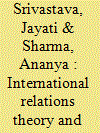| Srl | Item |
| 1 |
ID:
176141


|
|
|
|
|
| Summary/Abstract |
The discipline of international relations (IR) has often been critiqued for geo-centric parochialism with scholars increasingly engaging with its colonial origins and legacies. This recent engagement underscores the necessity to unravel and disrupt the epistemic sites of hierarchized power and knowledge relations manifested through dichotomous categorizations like ‘primitive/civilized’, ‘rational-irrational’ and ‘traditional-modern’. The concerns regarding ‘epistemic imperialism’ stemming from the superiority granted to the modern science over non-Western knowledges are founded on the distinction between nature and culture that hinges upon the separation of the subject from the object. Coloniality thus reconfigures itself through the use of scientific-rational methodology and it is pertinent to reframe the colonial question beyond the questions of epistemology and ontology to unpack ‘traditional knowledges’ as a source of valid knowledge. This article offers a methodological contribution to the larger debate on ‘coloniality of power’ by critiquing the disembodied monoculture associated with modern scientific rationality. Drawing upon Boaventura De Sousa Santos’s notion of ‘ecology of knowledges’, the article focuses on the issue of ‘epistemic imperialism’ and utilizes indigenous knowledge systems as an analytical framework with emancipatory potential representing one of the possible means of decolonizing knowledge and advancing the case for epistemological plurality within the discipline of IR. The article proposes an epistemic re-centring within the IR academia by posing vexatious ethical questions hidden behind issues of epistemic inequality.
|
|
|
|
|
|
|
|
|
|
|
|
|
|
|
|
| 2 |
ID:
151200


|
|
|
|
|
| Summary/Abstract |
Mainstream international relations theory is consumed by its proclivity towards order; the genesis of which has been attributed to its statist ontology. Such theorisations, by drawing binaries between order and disorder, either assume or normalise order or obfuscate and suggest ways of mitigating any kind of disorder. Paradoxically, questions about the foundational edifice of order are marked by silences. Within the context of world order, this obtains a theoretical framework that precludes any normative reflection on the making and unmaking of world order or the principles that sustain that order. The article looks at how different branches of international relations theory envisage world order and the silences embedded therein. Further, by locating order and disorder inhabiting the same reality along a continuum, alternative readings of world orders are drawn from the critical theoretical traditions in which various articulations of justice impart normative pillars to the world order.
|
|
|
|
|
|
|
|
|
|
|
|
|
|
|
|
| 3 |
ID:
190748


|
|
|
|
|
| Summary/Abstract |
The discipline of International Relations (IR) has been complicit in its representation of indigenous populations, often producing teleological narratives underpinning the superiority of the West and legitimizing colonial domination. The historical lived experiences of the indigenous peoples and their knowledge have been silenced and sidelined enabling the anchoring of discussions on political subjectivity and development from the vantage point of western modernity. The crisis of understanding modern statist practices of development plays out in the domain of ‘onto politics’—the politics of being whereby current governing practices are merely reflective of the colonial past. The practice of finance and the use of capital during the colonial era contributed to the embedding and actualization of colonial enlightenment thought on the inferiority of non-Europeans, while corollaries of money (property, trade) helped to produce implement hierarchies even amongst the indigenous colonized communities. The article is exploring a double relationship between knowledge production and practice: the first is how enlightenment scholars provided the rubric for racial hierarchies, and the second is the way money reified and reproduced those racist classifications through practice by looking at the colonial and post-colonial Indian state. In doing so, it advances the case to examine the relationship between indigeneity and knowledge production as constitutive to the modern Indian state.
|
|
|
|
|
|
|
|
|
|
|
|
|
|
|
|